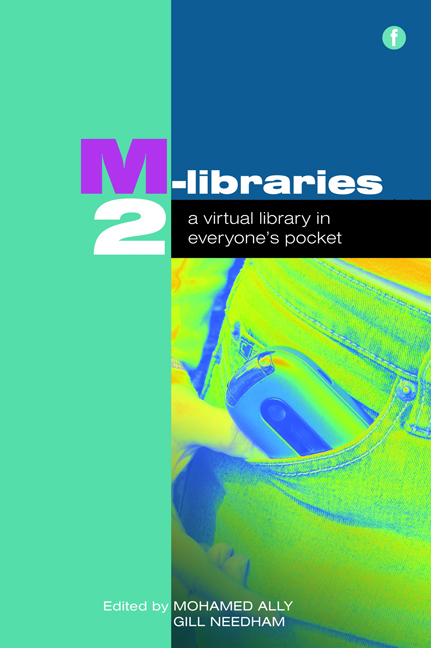Book contents
- Frontmatter
- Contents
- Acknowledgements
- Contributors
- Foreword
- Introduction
- PART 1 M-LIBRARIES: DEVELOPMENTS AROUND THE WORLD
- PART 2 TECHNOLOGY IN M-LIBRARIES
- PART 3 APPLICATION OF M-LIBRARIES
- 12 Mobile access for workplace and language training
- 13 Service models for information therapy services delivered to mobiles
- 14 Health literacy and healthy action in the connected age
- 15 ‘Ask us upstairs’: bringing roaming reference to the Paley stacks
- 16 The role of an agent supplying content on mobile devices
- 17 Portable science: podcasting as an outreach tool for a large academic science and engineering library
- PART 4 M-LIBRARIES AND LEARNING
- PART 5 BUILDING THE EVIDENCE BASE FOR M-LIBRARIES
- Conclusion
- Index
13 - Service models for information therapy services delivered to mobiles
from PART 3 - APPLICATION OF M-LIBRARIES
Published online by Cambridge University Press: 08 June 2018
- Frontmatter
- Contents
- Acknowledgements
- Contributors
- Foreword
- Introduction
- PART 1 M-LIBRARIES: DEVELOPMENTS AROUND THE WORLD
- PART 2 TECHNOLOGY IN M-LIBRARIES
- PART 3 APPLICATION OF M-LIBRARIES
- 12 Mobile access for workplace and language training
- 13 Service models for information therapy services delivered to mobiles
- 14 Health literacy and healthy action in the connected age
- 15 ‘Ask us upstairs’: bringing roaming reference to the Paley stacks
- 16 The role of an agent supplying content on mobile devices
- 17 Portable science: podcasting as an outreach tool for a large academic science and engineering library
- PART 4 M-LIBRARIES AND LEARNING
- PART 5 BUILDING THE EVIDENCE BASE FOR M-LIBRARIES
- Conclusion
- Index
Summary
Introduction
Mobile computer technology has increasingly penetrated the healthcare industry. The increasing capabilities of mobile phones, along with the powerful wireless network, have given a new dimension to earlier versions of telemedicine, which may be called mobile-health/m-health. Healthcare providers and physicians use mobile phones and the Short Message System (SMS) to exchange healthcare information with their colleagues and clients. Medical book publishers are changing the format of the medical reference books from electronic/online versions into mobile phone-compatible versions.
A recent approach in healthcare and patient safety that has gained significant attention from healthcare policy makers, health libraries and providers of consumer health information is information therapy (Ix), ‘the prescription of evidence-based medical information to a specific patient, caregiver, or consumer at just the right time to help the person make a specific health decision or behavior change’ (Kemper and Mettler, 2002, 3). Information therapy relies on ubiquitous, reliable and real-time evidence-based information at the point of care. ‘Information Therapy can range from an e-mail sent to every plan member with borderline blood pressure to recommending a website to a physician providing a diabetic patient with a copy of an article on the link between diabetic and heart disease’ (Consumer Driven Healthcare, 2004).
Both physicians and patients/caregivers need to receive the right information at the point of care to be able to make the right shared decision about the health problem. In addition, effective management of chronic diseases, common diseases and the majority of incurable diseases depends on behaviour change on the part of patients. Furthermore, most diseases are preventable and in such cases information is the main remedy. Therefore, correct information at the right time, for the right person, through the right media, that is available at any time and anywhere, seems to be the best solution for a successful information therapy service as well as for patient empowerment.
Although information is freely and widely available through the internet, in developing countries like India and Iran there are geographically isolated places lacking both internet connection and an appropriate health library (Taylor et al., 2001; Golozar, 2007). Therefore readily accessible health information via the internet is not an option for patients and physicians in these isolated areas.
- Type
- Chapter
- Information
- M-Libraries 2A virtual library in everyone's pocket, pp. 125 - 136Publisher: FacetPrint publication year: 2010



